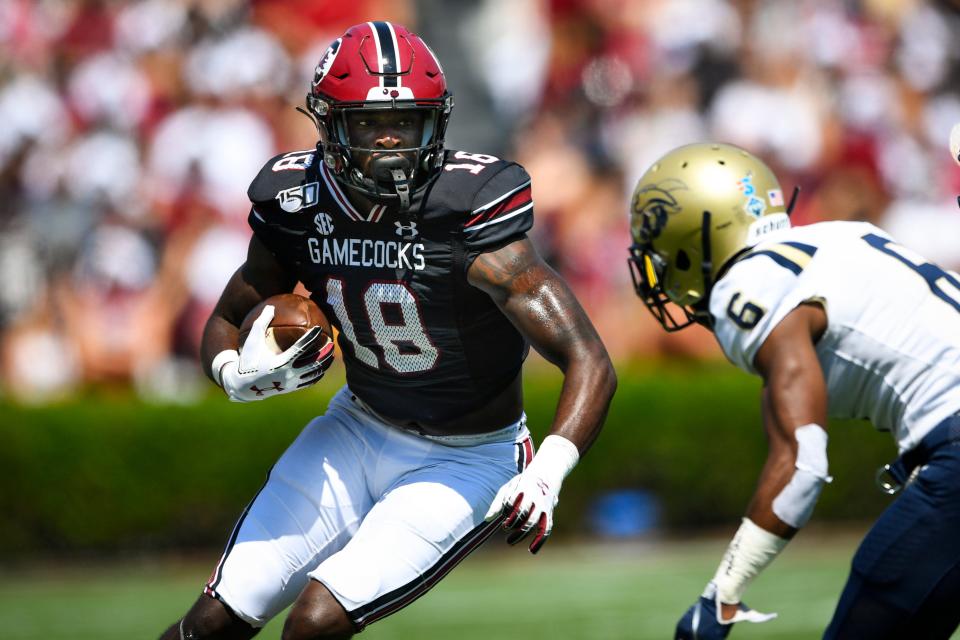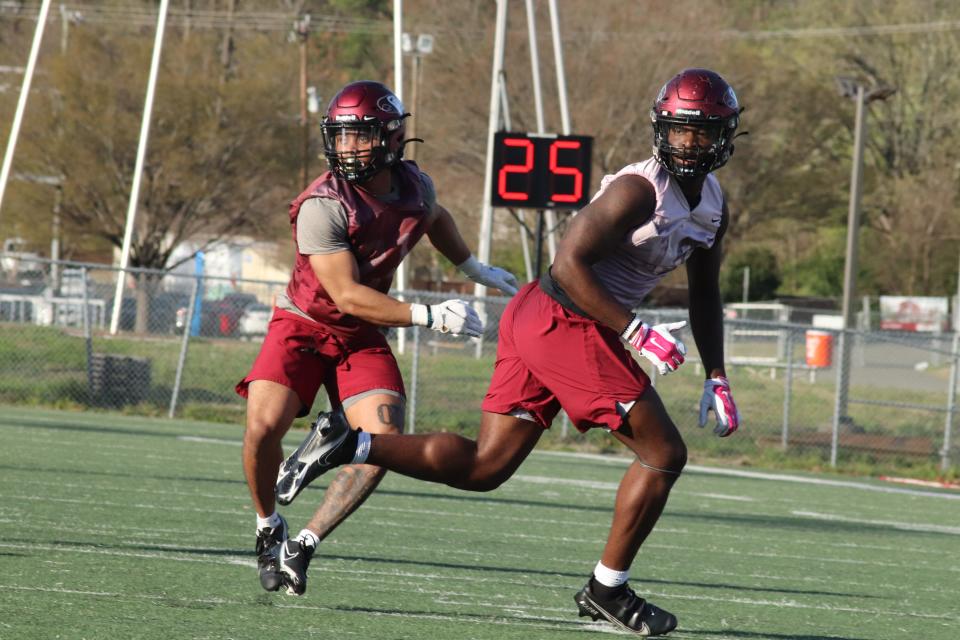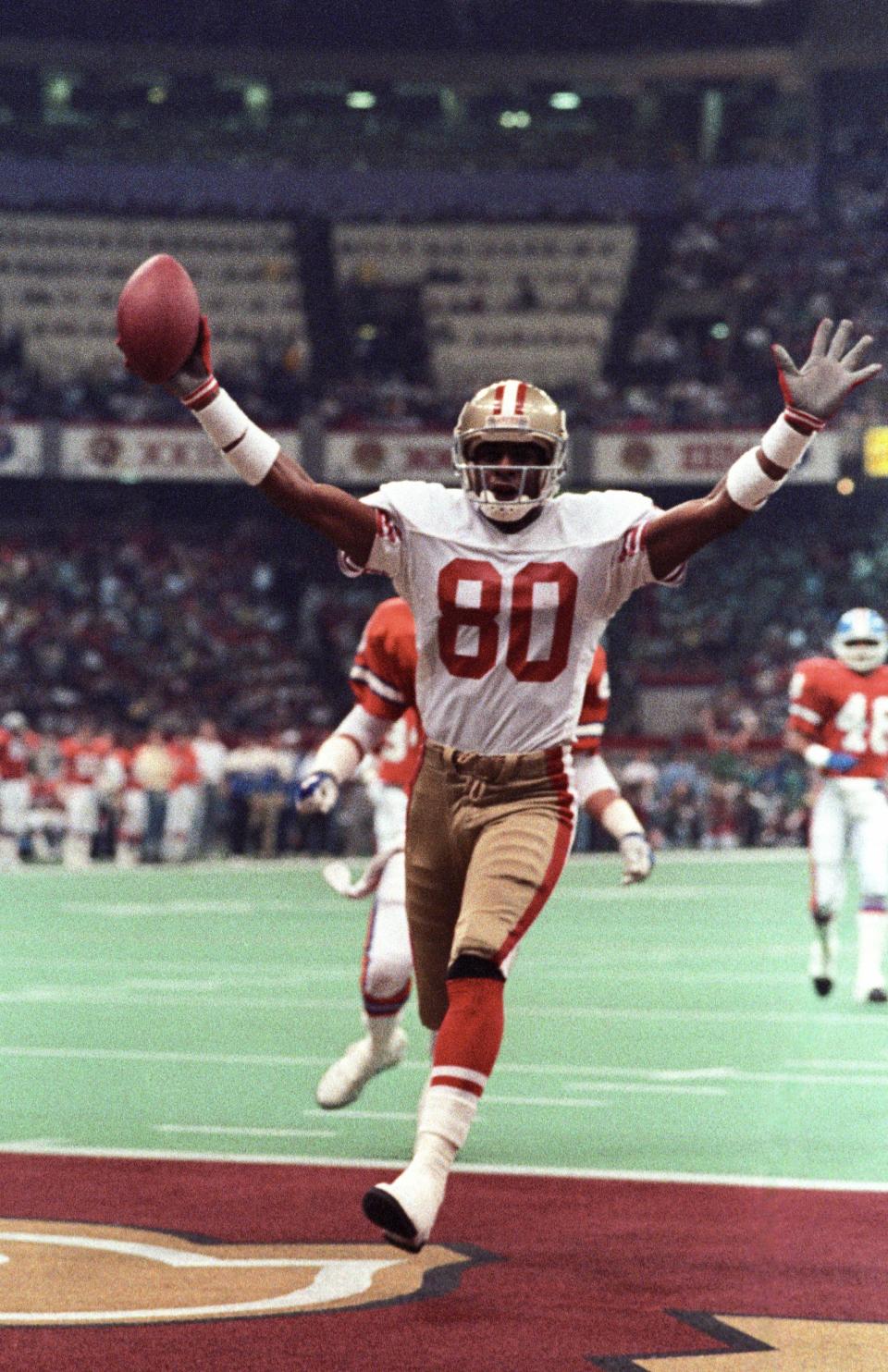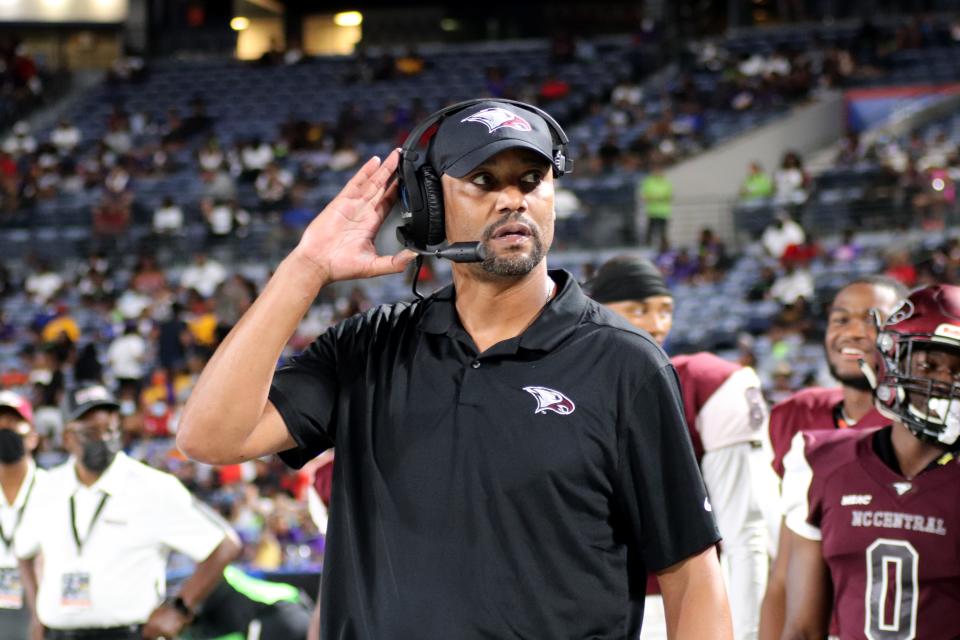Deion Sanders has helped HBCU football recruiting hit a new high. Is it paying off at NC schools?
- Oops!Something went wrong.Please try again later.
- Oops!Something went wrong.Please try again later.
DURHAM — When North Carolina Central’s Trei Oliver sits down to pitch a high school football recruit and his family, he’s keenly aware of what he can offer as a Division I FCS coach. And what he can’t.
Oliver can’t dazzle a prospect with the perks common across college football’s highest levels: a glitz and glamor he described as “the 80,000-seat stadiums and the four or five different helmet combinations and everything like that.” But the Eagles’ coach does have one clear advantage over his competitors.
“I can sell myself,” he said.
Oliver, 45, played football for N.C. Central from 1994 to 1997. He earned all-region honors as a defensive back and a punter. He advanced rapidly across 20 years as an assistant and coordinator for top historically Black colleges and universities. He landed the coaching gig at his alma mater in 2018.
He lays it out to parents like this: “I’m what your son will be able to do. That’s what I can offer … I’m what the other schools don't have, and I’m here to take care of your child and develop him into a man.”
That personal plea has resounded with plenty of prospects over Oliver’s three-plus years as N.C. Central’s coach: the type of players who may not have netted a flashy star rating on 247Sports or Rivals but produced for the Eagles, last season’s Mid-Eastern Athletic Conference runner-up, all the same.
Now, thanks to an evolving college football world, Oliver’s pitch is starting to reach the ears of a higher-profile audience. He has always approached recruiting with an inward focus, pursuing players he sees as good fits for N.C. Central regardless of who else has offered, but recently momentum’s hit a new level.
When N.C. Central announced its 2022 signing class in February, the list included not just the standard haul of in-state producers but a former SEC receiver who ranked as his state’s top recruit out of high school and a three-star linebacker whose Power Five offers included UNC, Georgia Tech and Louisville.
Those rumblings extend beyond N.C. Central’s Durham campus, too.
More: ESPN breaks new ground with executive produced Chris Paul, Stephen A. Smith HBCU documentary
A three-star defender committed to Saint Augustine’s, a Division II Raleigh HBCU, over various Division I FBS offers. At Greensboro’s North Carolina A&T, the country’s largest HBCU, the football program was a finalist for North Carolina’s top 2022 high school recruit and also signed a coveted cornerback transfer.
Meanwhile, NFL Hall of Fame cornerback Deion Sanders has drawn unprecedented attention and unprecedented talent to Jackson State, the Mississippi HBCU that hired him as its coach in 2020.
It’s an evolving phenomenon, one that reached a peak when No. 1 overall recruit Travis Hunter flipped his commitment from Florida State to Jackson State in December’s early signing period. And Oliver, now two decades deep into his HBCU football coaching career, has taken it all in with measured excitement.
“I see somewhat of a trend to it,” he said. “I just hope it’s not a fad.”
‘Us selling us’

Six years ago, OrTre’ Smith was the biggest name in South Carolina football recruiting: a four-star wide receiver and top 150 national recruit rubbing elbows with some of the country’s top college programs.
“I was always going somewhere for visits,” Smith said.
Notre Dame and Oklahoma courted him. Florida, Georgia and UNC made his top five. Dabo Swinney once offered to jump into a lake near Clemson’s campus if he committed to the Tigers at a cookout.
But the University of South Carolina ultimately won out. Smith, the state’s top-ranked 2017 recruit out of Wando High School, signed with the Gamecocks and made waves as a true freshman wide receiver.
He was cruising. Until he wasn’t.
Smith missed most of his sophomore year after corrective knee surgery, and lingering pain plagued him during a quiet third year. He also opted out of the 2020 season due to coronavirus pandemic concerns.
Suddenly, Smith wasn’t the up-and-coming wide receiver who caught 30 passes for 326 yards and three touchdowns and started 10 of 13 games on a roster stacked with future NFL pass catchers. He was a fifth-year backup who’d caught one pass and played 59 total snaps during USC’s first five games of 2021.
His time and eligibility running low, Smith entered the transfer portal in October.
“I wanted to win, but everyone has their personal goals and I felt like I wasn’t getting an opportunity …” he said. “I had nothing but respect for Coach (Shane) Beamer, but I decided that it was best for me.”
So began a very different recruiting process. Smith, 23, “knew some schools wouldn’t be interested because of my injury history and my age.” He was confident in himself and his abilities. At the same time, he wasn’t going to turn his nose up at anyone reaching out. He just wanted a good landing spot.

Enter the Eagles. Lonnie Teasley, a former N.C. Central assistant now working for Beamer as an offensive analyst, tipped off his old boss, Oliver, on a veteran receiver who might be a fit. N.C. Central hosted Smith and his mother for an official visit, and Oliver’s pitch rose above that of a few FBS contenders.
“Coach Oliver was a character,” Smith said, laughing. “It felt like I already knew him.”
“A prime example of us selling us,” Oliver said.
Smith enrolled in January, where he is pursuing a master’s degree in kinesiology and recreation administration and already dreaming big about N.C. Central’s 2022 season and his role within it.
But those plans haven’t been tainted by even a drop of cockiness. Smith didn’t saunter into N.C. Central’s spring practices assuming his 6-foot-4 frame or major catch radius or SEC pedigree had earned him a starting position. He just “went to work,” Oliver said, “and never complained about anything.”
“I didn’t care if it was an HBCU or a PWI,” Smith said. “I wasn’t going to turn down any opportunity.”
‘Doing more with less’

Around the same time N.C. Central was recruiting Smith last fall, one of its top rivals was also pulling from the FBS ranks in what Semaj Marsh, who covers N.C. A&T football, dubbed “a Christmas miracle.”
Former Kansas cornerback Karon Prunty was transferring to the Aggies, and he was bringing an impressive body of work in the Big 12, four years of eligibility and a whole lot of buzz with him.
“He’s a plug-and-play, first-day starter,” said Marsh, an N.C. A&T alum who broke the news of Prunty’s signing on Blue Death Valley, the message board and fan site he founded in 2004.
Landing Prunty, who allowed zero touchdowns in man-to-man coverage in his true freshman season, was a king’s ransom for a program diving headfirst into a new era after a long run of MEAC excellence.

N.C. A&T established itself as one of the nation’s top HBCU football programs by winning four Black college football national championships (the title given to the winner of the annual Celebration Bowl between the MEAC and Southwestern Athletic Conference champions) in five years and three in a row.
The coaching staffs of those 2015, 2017, 2018 and 2019 title teams produced three NFL Draft picks and three more players who appeared in the pros. They were “tremendous at development,” Marsh said.
That speaks to a larger trend: HBCUs have long been producing professional talent. The Pro Football Hall of Fame contains 29 HBCU alumni, a laundry list of one-time NFL superstars including wide receiver Jerry Rice, running back Walter Payton, defensive end Deacon Jones and offensive lineman Jackie Slater.
“The level of play is actually better than most people realize,” Marsh said. “What hurts us is the resources, but we’re always doing more with less. You’re going to get the players that fall through the cracks.”

As such, the occasional top football recruit does flirt with an HBCU. That applies to basketball, too, where five-star talents such as Makur Maker (who played a season at Howard) and Mikey Williams (who’s reportedly “leaning toward” an HBCU) made a deliberate effort to consider such programs.
That heightened awareness around HBCU athletics was nestled within a much larger movement: a national reckoning on race, privilege, social injustice and police brutality during the summer of 2020 after Minneapolis police officer Derek Chauvin murdered George Floyd, a Black man, on May 25, 2020.
Marsh picked up on the shift.
“It was almost customary to throw an HBCU in the mix,” he said.
It even happened in the Greensboro area Marsh calls home with Travis Shaw, a five-star defensive lineman at Grimsley High School whose recruitment drew national attention. Shaw included N.C. A&T in his top four schools with Clemson, Georgia and UNC last June before committing to UNC last August.
Travis Shaw is a Tar Heel pic.twitter.com/rZfmJJWL4h
— Chapel Fowler (@chapelfowler) August 21, 2021
After choosing UNC, Shaw said he included N.C. A&T as a finalist because “it’s all culture, and it’s my home school. I turn around and I can hear their band playing on game days. It’s right in my backyard.”
That was a nice gesture, Marsh said, but nothing more. Experts had unanimously (and correctly) predicted Shaw would choose UNC. An HBCU landing a five-star recruit remained a far-off dream.
“Then Deion got Travis Hunter,” he said.
‘A chance to get in the door’

Coach Prime, as Sanders often calls himself on social media, has made a lot of headlines since Jackson State hired the former high-stepping, interception-nabbing NFL dynamo as its coach two years ago.
None, though, was more consequential than when Sanders flipped Hunter, the Georgia high school cornerback who ranked as the nation’s No. 1 overall 2022 recruit, from Florida State to Jackson State.
Hunter initially chose FSU, Sanders’ alma mater, in March 2020. He held firm on that verbal pledge until last December, when, in what one national analyst dubbed “the biggest signing day moment in the history of college football,” he donned a white and navy blue cap and flipped his commitment to JSU.
“We always like to see David knock out Goliath sometimes,” Marsh said.
Hunter became the highest-ranked football recruit to sign directly with an HBCU out of high school in the modern era. His five-star ranking beat out that of Shedeur Sanders, a four-star 2021 recruit who flipped from FAU to — you guessed it — Jackson State, where he now starts at quarterback for his dad.
In Sanders’ first full season as Jackson State coach, the Tigers set a program record with 11 wins, won their first SWAC title since 2007 and appeared in the Celebration Bowl, losing to South Carolina State.
Jackson State’s final 21-man class of 2022 ranked 73rd in the country, per 247Sports, ahead of FBS programs including Marshall and N.C. State. The Detroit Lions also selected JSU linebacker James Houston IV in the sixth round of last month’s NFL Draft, ending a nine-year draft drought for the team.
“Jackson State is the belle of the ball right now,” Marsh, the Blue Death Valley founder, said.
“I think he’s brought a lot of awareness to HBCUs,” Oliver, the N.C. Central coach, said of Sanders.
Sanders, Oliver clarified, isn’t “reinventing the wheel” when it comes to recruiting. Plenty of HBCU coaches have pursued and landed top high school talent over the years. It’s just more of a visible pursuit in the internet era (imagine if today’s recruiting services retroactively re-ranked, say, Rice or Payton).

Still, Oliver said, “sometimes when you’re Deion Sanders, you can get a chance to get in the door a little bit more … when you’re one of the best to ever play the game, people are going to listen to you.”
Other HBCUs have followed that visible coach route. Former All-Pro Tennessee Titans running back Eddie George is entering his second year as coach at Tennessee State, and former Oakland Raiders and Cincinnati Bengals coach Hue Jackson is entering his first year as coach at Grambling State in Louisiana.
Closer to home, coaches such as Oliver and N.C. A&T’s Sam Washington have benefited from their programs’ on-field success — plus the aforementioned push among high schoolers to attend HBCUs.
Kaevon Freshwater, a three-star defensive lineman who ranked as North Carolina’s No. 40 overall recruit, had FBS offers from schools including Charlotte, Coastal Carolina and East Carolina but opted for Saint Augustine’s, a Division II HBCU in Raleigh. He’ll play football and basketball there, per his Twitter.
Albert Redd, a three-star linebacker and North Carolina’s No. 49 overall recruit, landed early FBS offers from UNC, Georgia Tech and Louisville, among others, but committed to N.C. Central. “Let’s open the eye up,” he wrote in a January commitment tweet. He ended the message with a hashtag: #BeDifferent.
man I ain’t never been more eager to go back to doing what I love pic.twitter.com/c3A9udH2wp
— Kp (@karonprunty9) February 14, 2022
Prunty, the former Kansas cornerback, was especially vocal after his N.C. A&T pledge.
“Hopefully this shows the youngins there’s nothing wrong with an HBCU and they’ll find you wherever you go,” he wrote on Twitter in December. “Let’s make our HBCUs great again. #AggiePride.”
‘The empire strikes back’

It’s an exciting trend.
But is it sustainable?
At Fayetteville’s Westover High School, Ernest King likes what he’s seeing. King is entering his fourth season as the school’s football coach, and he has a mantra that’s he repeated to many a Wolverine recruiting hopeful: “If you want every level to entertain you, you have to entertain every level.”
Sure, an offer from the prominent FBS schools who occasionally drop in on Westover — think Appalachian State and Charlotte and Duke — would be great, he tells his players. But so would a package from an FCS or Division II or NAIA program. HBCUs, especially in-state ones, fall squarely into the mix.
“We always used to compare” HBCUs to other FBS and FCS programs, King said, “but, skills-wise, there’s no comparison now. HBCUs can match up with the best … I mean, Joshua Williams from Fayetteville State is going to the Kansas City Chiefs. Coach Prime got him one (drafted). South Carolina State, too.”

King’s program has a strong relationship with Fayetteville State, one of seven in-state HBCUs competing in the Division II Central Intercollegiate Athletic Association. The same goes for CIAA members Elizabeth City State and St. Aug’s (which has signed seven Westover players over the last two recruiting cycles).
N.C. Central’s build a bond, too, most recently in its recruitment of Westover linebacker Twan Anderson, a fearsome pass rusher whose 28.0 sacks as a senior ranked fourth in the country per MaxPreps. Anderson, whose FBS interests included South Carolina, was one of the Eagles’ top 2022 commits.
“It’s been beneficial and not only to Black kids … whatever ethnicity you are, you can go to an HBCU and be successful,” King said. “To get five-stars to go there and realize they can make it at an HBCU is great.”
At the college level, prognosticators are encouraged but wary. HBCUs and FCS football programs as a whole have always faced an uphill battle, Marsh said, noting their scholarship discrepancies (they can offer 63 to an FBS school’s 85) and more modest facilities and smaller alumni bases and donor bases.
In an era of college football realignment, N.C. A&T, his alma mater, has moved aggressively to combat some of those deficits. After 50 years in the MEAC, the Aggies moved to the FCS Big South Conference and played there in 2021. Next up is the FCS Colonial Athletic Association, which they’ll join in 2023.
As name, image and likeness (or NIL) legislation and the transfer portal further define the sport, though, will that be enough to compete with Jackson State for big recruits? Or Power Fives? Unlike Sanders and his far-reaching appeal, “not everybody has a deal with Barstool Sports and Aflac,” Marsh said with a laugh.
“Every action has an equal opposite reaction,” he said. “We’re bracing to see what that reaction’s going to be from the Power Fives, because I think it kind of benefits their campus culture to promote HBCUs. But if HBCUs are actually competing against them for some of their talent? That’s a different story.”
“The empire’s going to strike back somehow,” he added.

Oliver is in the same boat. His N.C. Central program has dabbled in NIL education and splashy social media posts and the transfer portal with players such as Smith, but in a world where “everything revolves around the dollar,” as Oliver put it, that can only make so much of an impact on a recruit.
“If the SEC wants a guy, they’re going to get that guy,” Oliver said.
More important to Oliver is the season in front of N.C. Central, which, at 6-5 and 4-1 in conference, came up one game short of representing the MEAC in the Celebration Bowl last season. And recruiting the players who fit what he’s trying to build at his alma mater, star rankings and Alabama offers be damned.
He’s a proud HBCU graduate and a proud HBCU coach, and if you’re a top recruit looking to continue a growing college football trend, he said, come on down to Durham and see what N.C. Central’s all about.
“I hope we can keep it going,” Oliver said. “I really do.”
Chapel Fowler is a recruiting reporter for The Fayetteville Observer and the USA TODAY Network. Reach him by email at cfowler@gannett.com or on Twitter at @chapelfowler.
This article originally appeared on The Fayetteville Observer: HBCU football recruiting on the rise thanks to Deion Sanders

